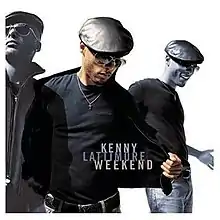Weekend (Kenny Lattimore album)
Weekend is the third studio album of American singer Kenny Lattimore. It was released by Arista Records on October 9, 2001 in the United States. It marked Lattimore's first album with the label, following his transition from Columbia Records.
| Weekend | ||||
|---|---|---|---|---|
 | ||||
| Studio album by | ||||
| Released | October 9, 2001 | |||
| Genre | R&B | |||
| Length | 46:25 | |||
| Label | Arista | |||
| Producer |
| |||
| Kenny Lattimore chronology | ||||
| ||||
| Singles from Weekend | ||||
| ||||
Biography
Weekend... [is] more conventional than its predecessor, playing it safe with Babyface-style ballads and "Girl, I can treat you better than him" lyrics... [it] lives up to its name--relaxing, romantic, sweet, and over far too soon.[1]
— Courtney Kemp, Amazon.com (Editorial review)
Weekend signified a new direction for Lattimore upon its release in 2001. Rather than progress further into the introspective soul territory of the critically acclaimed previous release From the Soul of Man, Weekend embraced a trendier modern-R&B sound. One reviewer observes, "On Weekend, he delivers an 11-track collection that alternately percolates and simmers, showing the young singer is equally at home whether he's pumping out a party jam or serenading a lover with a passionate ballad."[2]
This new album for a new record label enlisted the help of newer producers like The Characters (Troy Taylor & Charles Farrar), Raphael Saadiq (of Tony! Toni! Tone! fame), and G-funk pioneer Battlecat. Overall, the acoustic guitars, jazz sensibilities, and old soul with which Lattimore was previously associated was replaced with mechanical, stuttering beats, synthesizers, and youthful lyrics.
In a sharp contrast to previous releases, Lattimore sharply scales back his contributions as a songwriter in favor of experimenting with younger talent. Former writing collaborators such as Keith Crouch, Diane Warren, and Barry Eastmond were traded for up-and-coming talent like future hitmaker Johnta Austin, songwriter behind a chart-ubiquitous 2005 pair of songs: Mariah Carey's "We Belong Together" and Mary J. Blige's "Be Without You."
The album showcased its title track as an exuberant, uptempo first single. The bassline of "Weekend" interpolated Blondie's classic "Rapture." Though the single performed well at radio and was well-received across the Atlantic, overall album sales suffered from lack of promotion.
A sonically modern trend dominates the album, but a minority of songs stand in contrast to their counterparts. "Lately" and "Come To Me" are downtempo, bass-heavy, rhythmic tracks with 70's soul influenced arrangements and sensual lyrics. Both could have easily fit a thematic predecessor to From The Soul Of Man. Renowned for his lithe tenor voice, Lattimore slips into a Marvin Gaye-esque falsetto during the latter. Notably, the same timbre anchors Lattimore's cover of "Just to Keep You Satisfied," on the 1999 Marvin Gaye tribute Marvin Is 60. Also, Lattimore has also previously established a convention of closing each album with a gospel song. In this case, "Healing" produced by George Duke provides an organ-driven climactic coda to Weekend.
Track listing
| No. | Title | Writer(s) | Producer(s) | Length |
|---|---|---|---|---|
| 1. | "Weekend" |
| The Characters | 4:38 |
| 2. | "Baby You're the One" |
| The Characters | 4:10 |
| 3. | "Come to Me" |
|
| 4:42 |
| 4. | "Can You Feel Me" (featuring Shanice) |
| The Characters | 4:57 |
| 5. | "If Love Is What You Want" |
| The Characters | 4:26 |
| 6. | "Lately" | Dre & Vidal | 4:22 | |
| 7. | "Don't Deserve" |
| Drop Squad | 3:52 |
| 8. | "Right Down to It" | The Characters | 4:18 | |
| 9. | "The Things I'll Do" |
| Potts | 3:58 |
| 10. | "Who" |
| Vertelney | 4:16 |
| 11. | "Healing" |
| Duke | 2:46 |
| No. | Title | Length |
|---|---|---|
| 12. | "Goodbye Serenade" | 4:40 |
Samples
Charts
| Chart (2001) | Peak position |
|---|---|
| US Billboard 200[3] | 63 |
| US Top R&B/Hip-Hop Albums (Billboard)[4] | 24 |
References
- Courtney Kemp. "Kenny Lattimore: Weekend (Editorial Review)". Amazon.com.
- "What Men Don't Tell Biographies". MEI Productions.
- "Kenny Lattimore Chart History (Billboard 200)". Billboard. Retrieved January 20, 2020.
- "Kenny Lattimore Chart History (Top R&B/Hip-Hop Albums)". Billboard. Retrieved January 20, 2020.